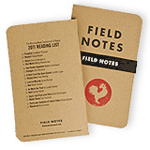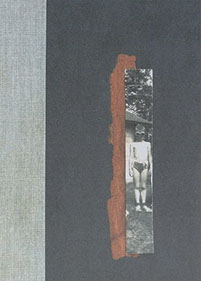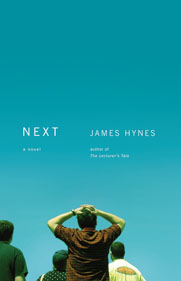-
March 23, 2011
Quarterfinals
-
Commentary by
Kevin Guilfoile & John Warner
-
Today’s Winner:
2Next
Kevin: Judge Williams provides an excellent analysis of these two novels, almost exactly mirroring my own thoughts. The only point on which he and I disagree would be this one:
The only thing that really bothered me was the way Hynes got me (and Kevin) to the very grand finale. Hynes keeps the reader clued in to certain unfolding events that are miraculously eluding Kevin. His blindness is much too conveniently manufactured. For a day-in-the-life book rooted very much in the real, this one magic trick felt particularly cheap.
Kevin walks through this novel in almost a daydream, with events unfolding on television and radio that he is vaguely aware of but doesn’t seem to attach appropriate significance to. But I’ve had days like that when fairly momentous things are happening and I’m oblivious to their significance until much later. The reader is supposed to be frustrated with Kevin’s obtuseness. For me, that was the source of the novel’s considerable tension. It seems Judge Williams felt manipulated by it, but I didn’t feel that way at all. And I’m glad it didn’t ruin the novel for him, because I really think Next is an extraordinary book.
 Buy anything from Field Notes from now until the end of the ToB and receive a special “reading list” memo book free, while they last. Use coupon code ROOSTER.
Buy anything from Field Notes from now until the end of the ToB and receive a special “reading list” memo book free, while they last. Use coupon code ROOSTER.John: One of the things I most admire about Next is its degree of difficulty. All of the action happens in a day, and for 85 percent of the book, there’s very little action other than Kevin wandering around in his reverie, trapped in these memories that seem to torture him. Nothing happens, until everything happens, and it’s a marvel that the book is able to pull the reader along so effectively. I don’t think it’s unbelievable that the events are eluding Kevin. Everything is eluding Kevin.
Next is also written in one of my favorite genres, the “white male fuckup” novel. Under this label I’m thinking of books like A Fan’s Notes, The Sportswriter, Home Land, The Water Method Man, Lucky Jim, Straight Man, An Arsonist’s Guide to Writers’ Homes in New England, and I could go on and on and on.
I recognize that in many, if not most corners of the world the white male fuckup novel has limited appeal, and furthermore, we’ve already reached saturation level when it comes to white male fuckup novels. (Despite this, I wrote one, and someone has agreed to publish it, suggesting there is an enduring market for such things.) I also would like to stipulate to the inherent unfairness over the fact that the white male fuckup novel often gets a de facto label of “literary” while its kissing cousin, so-called “chick lit” does not. I’m with Jennifer Weiner on this one.
It’s easy for me to understand why these novels appeal to me. I’m white and male and while I like to think I’m not a fuckup, somewhere in my DNA, I’m certain I have the capacity for it. Mostly, I feel lucky that I’ve escaped the sorts of things that short circuit the characters in these books, and the reason behind my luck is usually the women in my life. This may sound cockamamie—and I’m sure our readers can take me to task if it is—but in a lot of these books, I see a kind of feminist ethos, a recognition that at heart, man is terribly, terribly weak. In just about all of the above-mentioned books, what these men need is to put it in the cliché it probably is, the attention of a good woman.
The portrayal of these “good” women can begin to get a little dicey as far as my feminism argument goes, since these women are usually a kind of white male wish fulfillment: smart, capable, beautiful, sexually available, etc.… but we’d be crazy to want anything else!
(Anytime we categorize our wants, it’s going to look a little silly.)
Kevin: You left out the entire oeuvres of John Updike and Walker Percy. Volumes and volumes of hopelessly damaged men in need of a woman to save them. And I count many of those books among my favorites, as well. Go figure.
John: In Next Kevin is saved, at least temporarily, by one of these good women in the form of Dr. Claudia Barrientos, who Kevin, in typical white male fuckup form, mistakes for a nurse. She cleans and feeds him, even manages to nourish his soul a little bit (but not too much). In reading this section, I have to think that Hynes is offering us a bit of a wink at the white male fuckup conventions, also recognizing that Kevin isn’t going to be completely cured by something so simple.
Kevin: I’m going to suggest a not original and entirely commercial reason for the literary elevation of the WMFUN over chick lit, which is that women will actually read the WMFUN while men will not read chick lit. (It also doesn’t help that we call it “chick lit.”) It is ironic that the more generous and ecumenical reading habits of women (who are the majority of fiction readers) should diminish the status of writing about women, but that’s institutional patriarchy for you. If women had any idea that just by watching other women play basketball in significant numbers they could really screw TV programming sideways, thousands of years of male dominance would be on shaky ground.
We should take a moment to acknowledge the ways that Nox shook up the early part of this tournament, provoking a great deal of discussion here and across the internet. At a time when the book is facing something of a existential crisis, being forced to sit down and spend time with a beautiful object like Nox, a work that could perhaps be replicated in electronic form as some sort of multimedia project but not without changing the experience in a fundamental way, felt a little like therapy. In a good way.
John: The other day, a student asked me what I thought about “enhanced” book editions like the recently released iPad version of Roots, which includes multimedia material like archival news footage and interviews. I think these forms are really interesting, and I’ve often thought about how much fun it would be to have the ability to access a kind of director’s commentary track for books, where the authors could walk us through different elements in the text, sharing influences or inspirations. The possibilities seem endless, but I also think these new forms aren’t necessarily “books” and that maybe we should just come up with some other name for them. The electronic version of Nox you envision could be really cool, but as you say, it would be a different thing. I tend to think that we should let books be books, even while we encourage other forms of narrative storytelling enhanced by technology.
Kevin: This decision places Next in the semifinals, where a pair of heavyweights, Freedom and A Visit From the Goon Squad, are already prepping for battle. I have to say I’m fairly pleased with the outcomes so far—those are three of my favorite books from last year. Tomorrow we find out if Model Home or The Particular Sadness of Lemon Cake will round out our not-so-final four.
As for Zombie results, this match doesn’t affect the standings. If the Zombie Round were held today, Skippy Dies and Room would still be our peeled-flesh participants.
Kevin Guilfoile is the author of two acclaimed novels, Cast of Shadows and The Thousand, which have been translated into more than 20 languages.
John Warner’s novel, The Funny Man, will be released late September of this year by Soho Press. For the time being, he teaches at Clemson University.

















